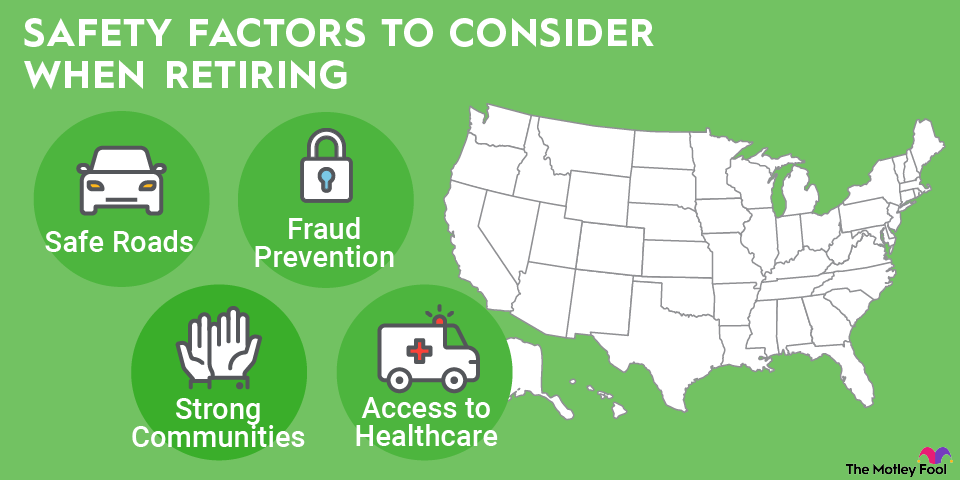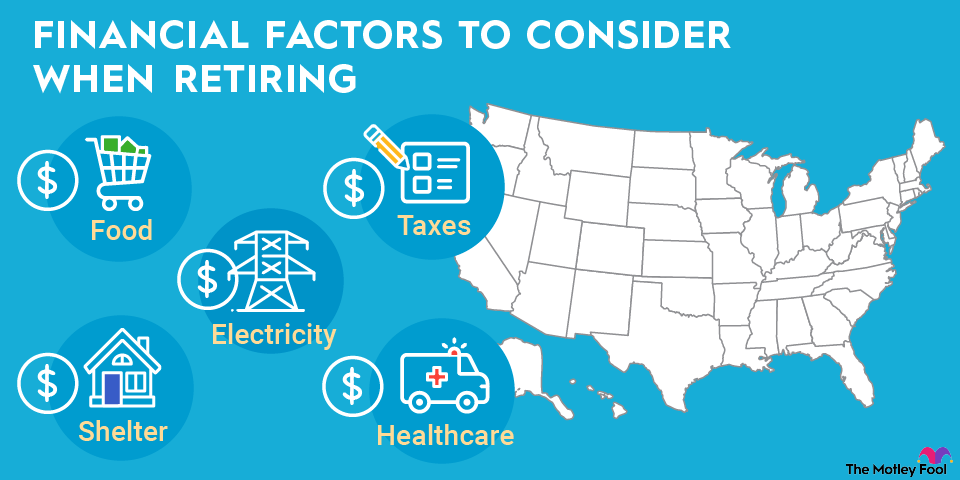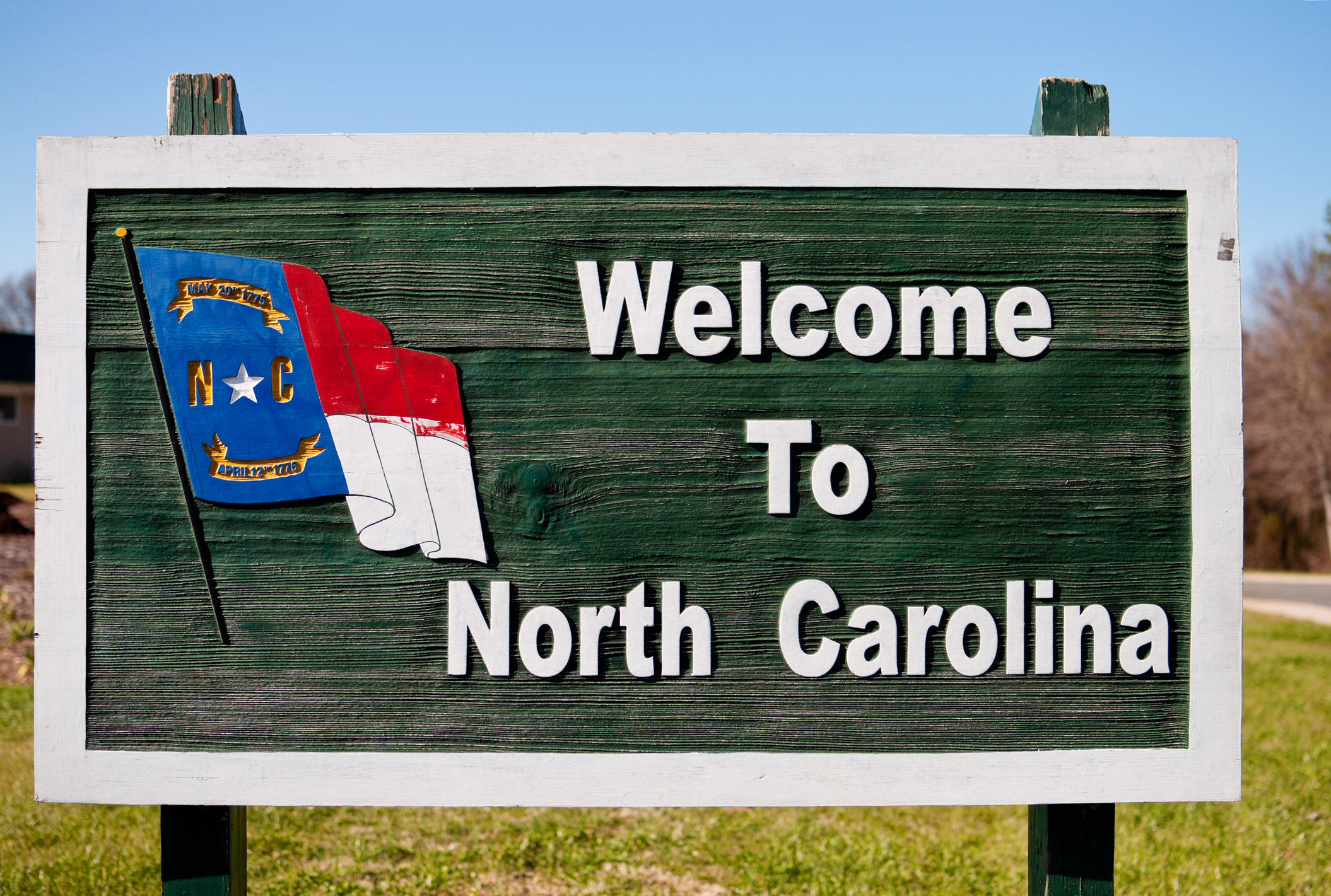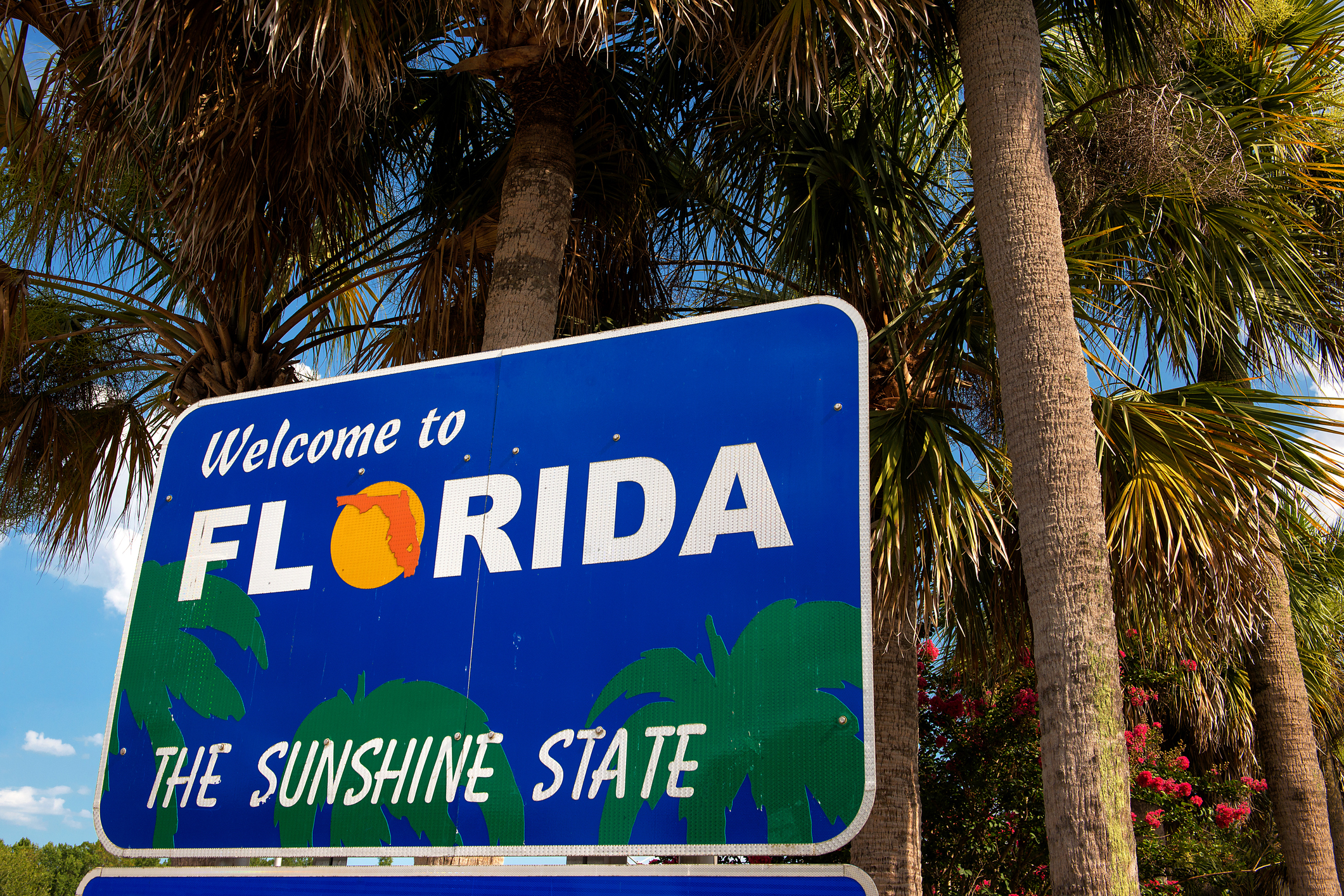The worst states to retire in have high taxes and living costs, lack access to affordable healthcare, and rank poorly for other quality-of-life factors, like weather and crime. If you're starting to think about where you might live in retirement, you're in the right place.
We'll cover the worst states to retire in and what makes them poor choices for many seniors. We'll also cover some tips on retirement planning and choosing a destination for your golden years.

Five worst states to retire in 2025
A recent Motley Fool study ranked the best and worst states to retire to in 2025. The Motley Fool surveyed 1,500 Americans 55 and older to find out the retirement factors that were most important to them.
In addition to primary data collected by The Motley Fool, the study used data and rankings from numerous reputable sources. These included The Council for Community and Economic Research's Cost of Living Index, Zillow Home Value Index, United Health Foundation's America's Health Rankings, the FBI Crime Data Explorer, and the National Incident-Based Reporting System.
This data was then used to compile an index to rank the best states in which to retire. The index used the following factors and weights:
- Quality of life: 15.2%.
- Housing cost: 14.9%.
- Healthcare quality and cost: 14.8%.
- Crime: 14.8%.
- Taxes: 13.7%.
- Cost of living: 13.6%.
- Weather: 13.1%.
When choosing the worst states to retire, it's important to understand why some of these factors weighed so heavily in the final outcome.
- Overall living costs: Most people considering relocation for retirement prioritize lowering their living costs, and this is often among the top reasons for moving in the first place. These costs can include both housing and nonhousing costs, such as transportation, utility, and grocery costs.
- Taxes: We considered overall tax-friendliness, including whether each state has an income tax, along with whether property tax and sales tax rates are high.
- Healthcare: We looked at the costs and accessibility of healthcare, along with the mortality for common conditions associated with older age.
- Weather: You probably don't want to sit inside all day during your retirement, so we factored in the prevalence of extreme weather.
- Other quality-of-life factors: Other things we weighed in choosing the worst retirement destinations included crime rates, infrastructure, pollution, and amenities.
Individual scores for various factors were then normalized on a 0 to 100 scale. Based on these criteria, here are the five worst states to retire to in 2026.
1. New Mexico
New Mexico does not tax the majority of individuals receiving Social Security benefits unless they meet certain higher income thresholds. However, income from pensions and retirement accounts is taxable for state residents.
The state scored fairly well for housing and cost of living in The Motley Fool's study, with scores of 80 and 93, respectively.
However, it has the worst crime rate nationwide, with a crime score of 0, ranking 50 out of 50 states. New Mexico also nabbed the second-lowest quality-of-life score. The state's healthcare score was 42, while New Mexico scored 50 out of 100 for taxes.
According to FBI data, New Mexico has one of the highest rates of violent crime against older adults in the nation. On average, violent crimes against seniors in the state occur at a rate of 212.2 per 100,000 individuals.
2. California
Retirees who spend their golden years in California could enjoy many benefits like stunning natural scenery, a mild climate year-round, diverse cultural experiences, ample outdoor activities, and participating in the world's fifth largest economy.
It's no shock to anyone that California is one of the most expensive places to retire. In The Motley Fool's study, California was ranked 49th out of 50 states to live, the second worst state to retire in overall.
California taxes pensions, although it does not tax Social Security benefits. The state is also known for having some of the highest personal income tax and sales tax rates in the country.
California has the second-highest cost of housing, third-highest cost of living, and fifth-highest tax burden of all 50 states. The state garnered an overall score of 16 out of 100 in the study.
On the other hand, factors where California received the highest scores included quality of life (84 out of 100), crime (71 out of 100), and weather (63 out of 100).
3. New York
If you're looking for major tax savings in retirement, you may want to cross New York off your list. New York doesn't tax Social Security benefits, but property taxes, income taxes, and sales taxes are among the steepest in the nation. However, people 65 and older may qualify for property tax exemptions, provided that they meet certain criteria.
In The Motley Fool's study, New York garnered the worst tax score in the country, scoring 0 out of 100. The exorbitant cost of housing in New York, even outside urban areas, could also deter retirees with a more modest sum for their older years.
However, it wasn't all bad news for New York. For example, The Empire State snagged the fifth-best quality-of-life score at 92 out of 100.
4. Arkansas
Arkansas has numerous green flags going for it, including beautiful natural attractions like rivers, mountains, forests, and hot springs. The state is also one of the most affordable places to reside in and be a homeowner, garnering a housing score of 94 out of 100 in The Motley Fool's study of the best and worst states to live in.
However, Arkansas still made it to the list of the top five worst states to retire in. The state received low scores for quality of life, public health, and crime, resulting in an overall score of 18 out of 100.
Broken down by the scoring factors, Arkansas received a 12 for quality of life, 18 for healthcare, and 25 for crime.
The state exempts Social Security benefits from taxation, but other forms of retirement income are taxable. Certain exemptions for pension or retirement account income can reduce that overall tax burden.
5. Nevada
Nevada is the fifth worst state to retire in, according to The Motley Fool. Nevada achieved moderate scores for quality of life (52 out of 100), cost of housing (60 out of 100), taxes (56 out of 100), and weather (47 out of 100).
However, it scored lowest in terms of public health and crime factors. These scores were 32 and 24, respectively. In the end, Nevada received an overall score of 19 out of 100.
Nevada is also one of the worst states for fraud and violent crime against older adults. The state has 240.8 victims of fraud per 100,000 older adults and 1,676.4 victims of property crime per 100,000 older adults.
Nevada doesn't have a state income tax. Neither retirement benefits nor Social Security benefits are taxable in Nevada.
Expert tips for retirement planning
There are plenty of factors to consider when you're planning for retirement and determining where you want to live once you're no longer working. Follow these tips for choosing the right place.
- Try renting first: Before you sell your home and pack up your life, try renting for at least several months in your planned destination. That way, you can figure out the good and the bad about living there. You can also start building your community so you'll have a social circle if you actually move.
- Budget for overall costs: Don't just choose a retirement location because it has low taxes or housing costs. Look at the overall cost of living there, including property insurance, available services, and general living costs. You may find, for example, that a place with higher tax rates is worth the cost because it has strong public transportation that allows you to give up your vehicle.
- Make a list of your priorities and deal-breakers: No place is perfect. But make sure you think through what really matters to you. Perhaps you can deal with not having a beach house if you have easy access to your favorite hobbies. Or maybe you're willing to live with less-than-perfect weather because you'll be close to family members and friends. It's your retirement, so you get to decide what matters to you.
Should you consider these states for retirement?
Of course, we're not saying that everyone should rule out living in the five states we chose as the worst states in which to retire. If you've built a large retirement nest egg, you might have the freedom to choose a retirement destination that would be unaffordable for most.
Other factors you'll need to consider are whether you prefer rural, urban, or suburban living, along with the amenities you're seeking and how close you want to be to family and friends. You may also want to consider looking beyond the U.S. and explore options for retiring abroad.
The best states to retire usually rank well for affordability, quality of life, low taxes, and good healthcare. But ultimately, you need to choose the factors that matter to you.





